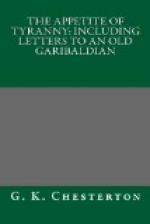It is vital in a discussion like this, that we should make sure we are going by meanings and not by mere words. It is not necessary in any argument to settle what a word means or ought to mean. But it is necessary in every argument to settle what we propose to mean by the word. So long as our opponent understands what is the thing of which we are talking, it does not matter to the argument whether the word is or is not the one he would have chosen. A soldier does not say “We were ordered to go to Mechlin; but I would rather go to Malines.” He may discuss the etymology and archaeology of the difference on the march; but the point is that he knows where to go. So long as we know what a given word is to mean in a given discussion, it does not even matter if it means something else in some other and quite distinct discussion. We have a perfect right to say that the width of a window comes to four feet; even if we instantly and cheerfully change the subject to the larger mammals; and say that an elephant has four feet. The identity of the words does not matter, because there is no doubt at all about the meanings; because nobody is likely to think of an elephant as four foot long, or of a window as having tusks and a curly trunk.
It is essential to emphasise this consciousness of the thing under discussion in connection with two or three words that are, as it were, the key-words of this war. One of them is the word “barbarian.” The Prussians apply it to the Russians: the Russians apply it to the Prussians. Both, I think, really mean something that really exists, name or no name. Both mean different things. And if we ask what these different things are, we shall understand why England and France prefer Russia; and consider Prussia the really dangerous barbarian of the two. To begin with, it goes so much deeper even than atrocities; of which, in the past at least, all the three Empires of Central Europe have partaken pretty equally, as they partook of Poland. An English writer, seeking to avert the war by warnings against Russian influence, said that the flogged backs of Polish women stood between us and the Alliance. But not long before, the flogging of women by an Austrian general led to that officer being thrashed in the streets of London by Barclay and Perkins’ draymen. And as for the third power, the Prussians, it seems clear that they have treated Belgian women in a style compared with which flogging might be called an official formality. But, as I say, something much deeper than any such recrimination lies behind the use of the word on either side. When the German Emperor complains of our allying ourselves with a barbaric and half-oriental power he is not (I assure you) shedding tears over the grave of Kosciusko. And when I say (as I do most heartily) that the German Emperor is a barbarian, I am not merely expressing any prejudices I may have against the profanation of churches or of children. My countrymen and I mean a certain and intelligible thing when we call the Prussians barbarians. It is quite different from the thing attributed to Russians; and it could not possibly be attributed to Russians. It is very important that the neutral world should understand what this thing is.




